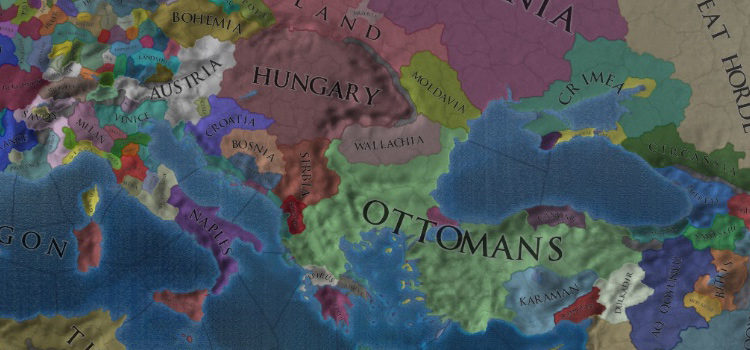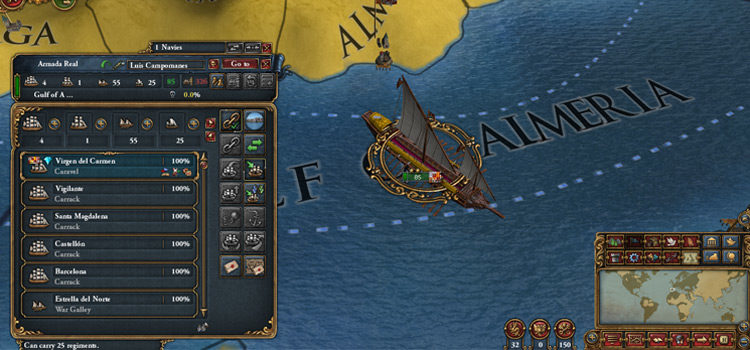How To Reduce Corruption in Europa Universalis IV
This post may contain affiliate links. If you buy something we may get a small commission at no extra cost to you. (Learn more).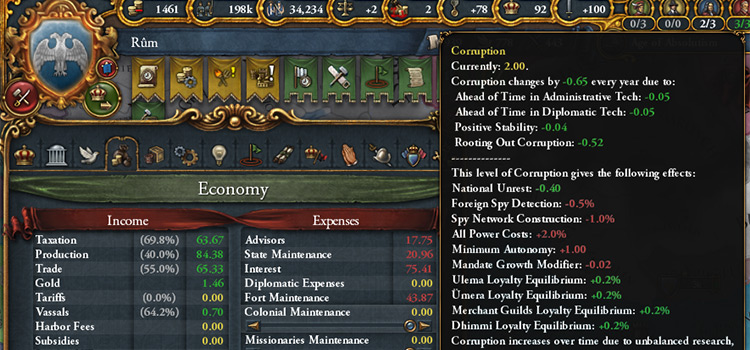
All sources of corruption reduction come in the form of gradual yearly reductions, so there is no fast solution here. But the largest corruption reducing method is the -1 yearly drop you can get by sliding the “Root Out Corruption” slider all the way to the right. It will cost you heaps of money though!
Ultimately, the best course of action is to constantly keep an eye on corruption and never let it grow more than a couple points.
Reducing Corruption
Frankly, corruption is one of those things you do not easily get rid of. Especially if you’re following a non-Muslim faith.
Almost every single source of corruption reduction is a yearly trickle, with most sources ranging from -0.05 to -0.10.
These are the corruption modifiers readily available to all nations:
- -0.02 yearly per stability
- -0.05 yearly for being ahead in administrative technology
- -0.05 yearly for being ahead in diplomatic technology
- Up to -1 yearly, depending on expenditure through the relevant slider in the economy tab

Furthermore, ideas and policies provide some sources of corruption reduction:
- Certain national ideas provide -0.1 yearly (e.g., Russian)
- Espionage idea #7 provides -0.1 yearly
- Defensive-Administrative policy provides -0.1 yearly
- Espionage-Administrative policy provides -0.1 yearly
- Espionage-Defensive policy provides -0.1 yearly
Now, out of all these, you can clearly see that the only sizeable modifier is the “Root Out Corruption” slider in the economy tab.
It comes at a steep cost though. The cost is 0.05 ducats per month per total effective development (development after adjusted by autonomy in each province).
Muslims are in the unique position of having access to a button in the religion tab that instantly shaves off 2 corruption, available when they have high piety. They are also eligible for a frequent pulse event reducing it by 2 as well.
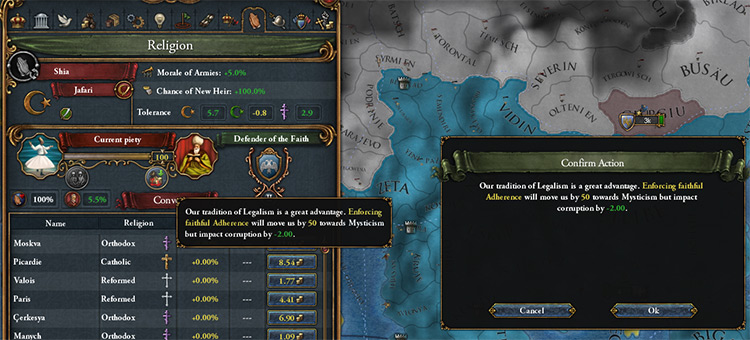
Another notable mention is the scaled reduction Confucian nations get, up to -0.5 at 100 harmony.
Catholics with the “Forgive Usury” papal action active get -0.04 yearly, while Zoroastrians with the Yasna ritual active get a -0.05 yearly.
Effects of Corruption
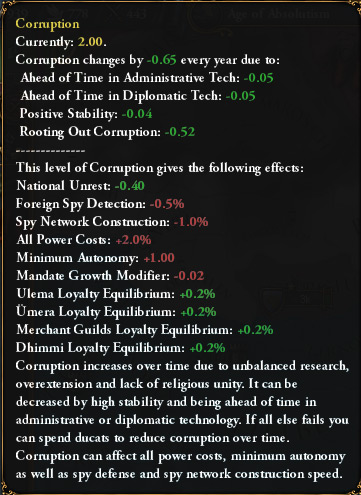
Corruption provides the following effects at 100 corruption, with the effects scaling from 0 to 100:
- -25% Foreign Spy Detection
- -50% Spy Network Construction
- +100% All Power Costs
- 50% Minimum Autonomy
- -20 National Unrest
- -1 Mandate Growth Modifier
- +0.025 Monthly Heir Claim Increase
- +10% Loyalty of All Estates
On top of all that, when at +3 stability with less than 1 corruption and corruption not growing you will be getting a couple of good events per year, while having more than 2 corruption allows bad events to fire.
Having more than 10 corruption replaces these events with even worse ones.
Of course, you will never see 100 corruption in a country. The effects are scaled; for example, 2 corruption provides the effects seen in the screenshot above. You will also get an increase to the maximum monarch points you can stockpile based on your corruption.
The positive effects of corruption may be tempting at first glance, but the negative ones simply cripple you.
Unless you’re using corruption to cheese revolts or to stockpile huge amounts of monarch points for some reason, you should avoid it like the plague.
The increase to All Power Costs and the increased Minimum Autonomy can destroy even the largest of nations. 50% minimum autonomy essentially means that whatever you do, your country’s effective development is halved!
How To Handle Corruption
Dealing with corruption after it has reached some high number isn’t the ideal solution. There simply aren’t enough sources of instant reduction.
What you need to do is never let it grow.
Ultimately, as with most things in life, prevention is better than cure.
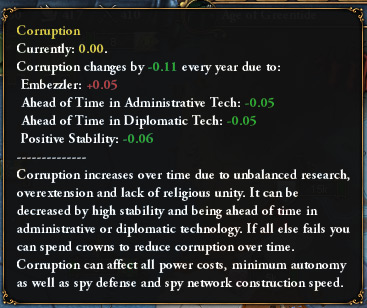
Sources of Corruption
The silver lining is that in the same manner it does not go down quickly, corruption does not rise out of nowhere either. There are events that raise corruption, but your biggest concern should be yearly trickle from various sources that might seem insignificant at first.
The main sources of corruption are:
- +0.005 yearly per point of overextension
- +0.001 yearly per point of religion unity below 100%
- +0.3 to +0.5 yearly due to unbalanced research (when the tech difference of your technologies is over 3)
- +2 immediately when you press the “Debase Currency” button in the economy tab
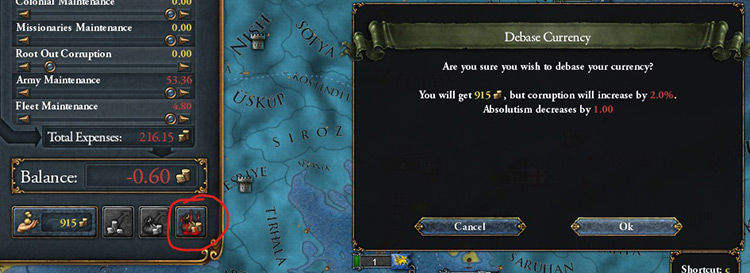
The small trickle from the sources above might seem negligible but I assure you it can stack quite aggressively.
Let’s say you remain at 60% overextension for 2 years and average 70% religious unity for 6 years. This adds up to 0.6 corruption from the overextension and another 0.18 from religious unity.
Now this might still seem like a small number, but you must keep in mind that even as much as 3 corruption increases every single monarch point expenditure of yours by 3%, while also reducing your effective development outside the capital by a 1.5%.
There are other sources of corruption like appointing cardinals in your lands as the Papal State or recruiting banners. These aren’t available to most nations but do keep an eye out for any such sources in your campaigns.
Debase Currency & Corruption
The Debase Currency button deserves a section to itself as it can be a life saver in certain situations.
It gives you an influx of income equal to 2 years’ worth, while raising corruption by 2. It can be used up to 5 times before you have to wait for it to be available again.
If you absolutely must win a war or pay off some nasty loans, debasing your currency can be the correct move.
Be sure you can handle the corruption effective immediately though.
The most common scenario is debasing to repay loans and then reducing corruption while minimizing any monarch power usage until it is reduced to near zero.
Corruption Tips and Tricks
Your main concern should be to prevent the accumulation of corruption. So let’s look at some tricks to help you do this.
The slider in the economy tab should usually sit at around 1/3 maintenance, providing a nice -0.3 corruption yearly.
If it exceeds your needs, it automatically pays less or even zero ducats, so don’t worry about micromanaging it. You can always raise its maintenance as needed.
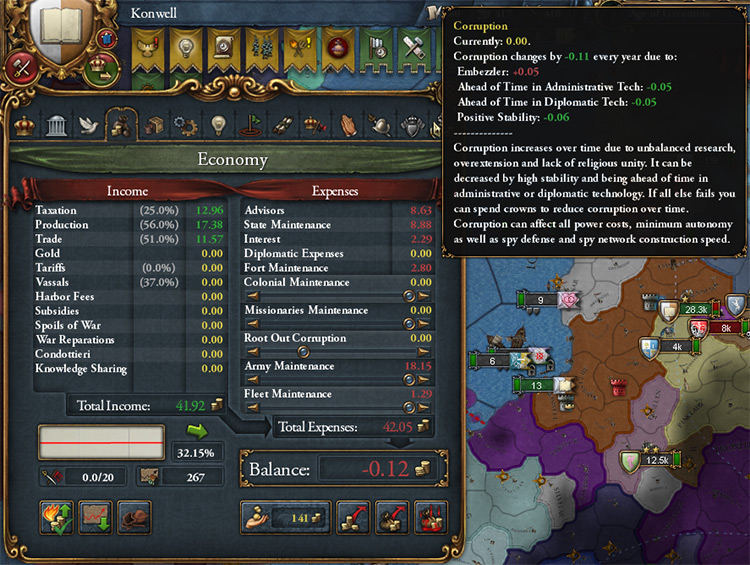
A spike in yearly corruption is inevitable after a burst of conquest.
This is due to overextension and potentially reduced religious unity.
It goes without saying that you should core the land as soon as possible. Increasing maintenance on the slider during these periods is advised.
Tip: Debasing currency and instantly getting rid of the corruption as a Muslim nation is a neat trick you can do for some quick cash. If a corruption-reducing events fires while you are at zero corruption, you can always press the Debase Currency button while paused to make full use of the event.
Avoiding the unbalanced research malus is not hard in most campaign. It usually happens in certain campaigns when you conquer too much land early on and do not have points to increase your ADM tech. Even in these cases, it usually won’t last for more than a decade or so.



